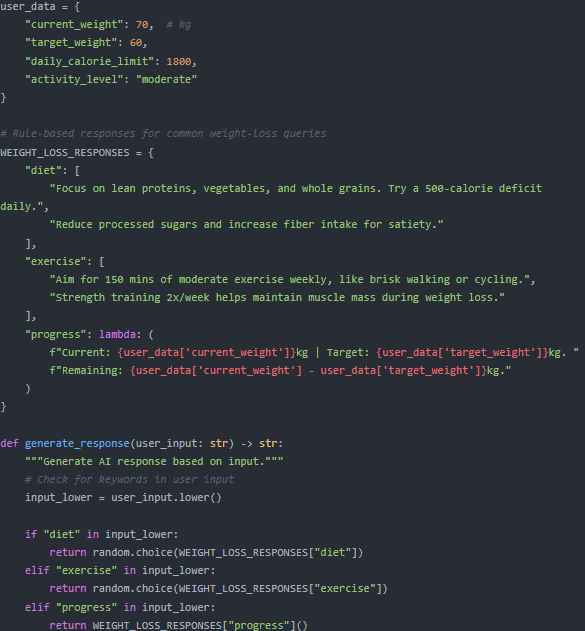Benjamin Taylor


Hello everyone! I’m Benjamin Taylor, a passionate innovator deeply immersed in the realm of artificial intelligence, with a specific focus on developing cutting-edge, fully automated conversational AI solutions for weight loss. My journey in this field has been driven by a profound desire to leverage technology to improve people’s health and well-being.
My fascination with AI began during my academic pursuit of computer science and data analytics. Recognizing the transformative potential of AI in healthcare, I decided to channel my expertise into creating tools that could make a real difference in individuals' lives. With years of experience in developing AI models and natural language processing systems, I’ve dedicated myself to crafting intelligent solutions tailored to the unique challenges of weight management.What sets my work apart is the integration of user feedback and continuous improvement. I believe that the best AI solutions evolve with real-world usage. By analyzing how users interact with the system, I refine the algorithms to make the advice more accurate and the conversations more engaging. This iterative approach ensures that the AI remains at the forefront of effectiveness in weight loss support.
One of my key projects involves building an AI that acts as a personalized weight loss companion. This system doesn't just offer generic advice; it engages in dynamic conversations with users, understanding their specific goals, lifestyles, and dietary preferences. Using advanced machine learning algorithms, it analyzes vast amounts of data, including nutritional information, exercise science, and medical research, to generate customized weight loss plans. For instance, it can design a tailored meal plan that fits a user’s taste while ensuring a balanced intake of essential nutrients and an appropriate calorie deficit. Additionally, it creates personalized exercise routines, taking into account factors like fitness levels, available equipment, and time constraints.
But my AI goes beyond just planning. It serves as a constant source of motivation and support. Through regular check-ins and empathetic conversations, it helps users stay on track, addresses their concerns, and provides psychological encouragement when they face setbacks. It’s like having a personal coach available 24/7, adapting to each user’s progress and adjusting strategies as needed.
In this era where health is a top priority, I’m excited to contribute to the development of AI-driven weight loss solutions. I firmly believe that combining the power of technology with a human touch can revolutionize how we approach weight management, making healthy living more accessible and sustainable for everyone. I’m always eager to collaborate with like-minded professionals and explore new frontiers in this rapidly evolving field, aiming to create AI that truly transforms lives.
Thank you for taking the time to get to know me and my work! I look forward to sharing more insights and collaborating on future projects.


Personalized Meal Planning: Some AI models, like the ones integrated into platforms such as the “Reduce order” weight management large model, can analyze food images or descriptions provided by users. They can quickly identify the type and quantity of food, calculate its calorie content and nutritional value, and then offer targeted dietary advice. For example, it might suggest swapping high-calorie processed foods with healthier alternatives like lean proteins, whole grains, and an abundance of fruits and vegetables.
Custom Exercise Guidance: Acting as a virtual personal trainer, the AI designs exercise programs tailored to an individual's physical capabilities and goals. If a user has joint problems, the AI will avoid recommending high-impact exercises like running and instead suggest low-impact activities such as swimming or cycling. It also gradually increases the intensity and complexity of the exercises as the user progresses, similar to how a human trainer would adjust a workout plan.
Ongoing Support and Motivation: Weight loss is a long and often challenging journey, and maintaining motivation is crucial. The AI provides continuous support through regular check-ins. It offers encouragement when users face setbacks, like when they struggle to stick to their diet or exercise routine. It can also address concerns and provide psychological support, much like a dedicated friend or coach. For example, if a user is feeling demotivated because of a lack of visible results, the AI can offer advice on adjusting the plan and remind them of the long-term health benefits of their efforts.
Real - Time Adjustments: The best weight loss AI systems can adapt to changes in a user's situation. If a user suddenly becomes busier and has less time for exercise, the AI can modify the exercise plan to include more short, high-intensity workouts that can be done at home. Or if a user's health condition changes, the AI can adjust the diet and exercise recommendations accordingly.




Moreover, AI may play a more significant role in preventive healthcare by identifying individuals at risk of obesity - related diseases early on and implementing weight management strategies to mitigate those risks. It could also be integrated into workplace wellness programs, schools, and healthcare facilities, making personalized weight loss support more accessible to a broader population.
In conclusion, fully automated conversational AI for weight loss is a powerful tool that has the potential to revolutionize the way we approach weight management. By providing personalized, convenient, and effective support, it is helping countless individuals take control of their health and achieve their weight loss goals.